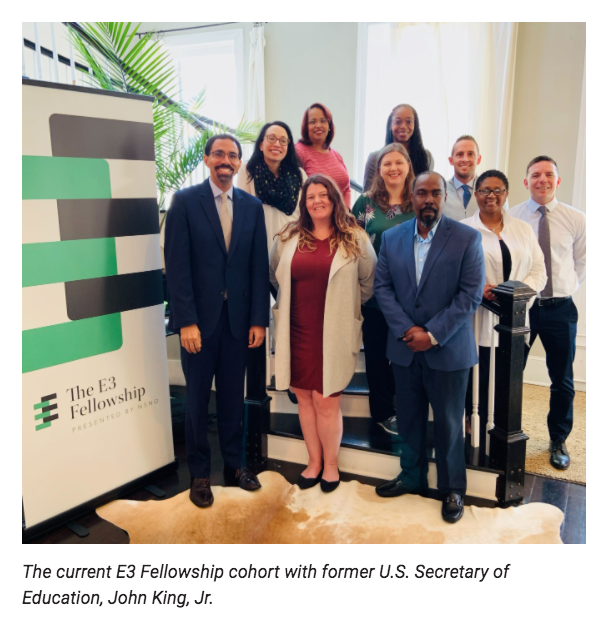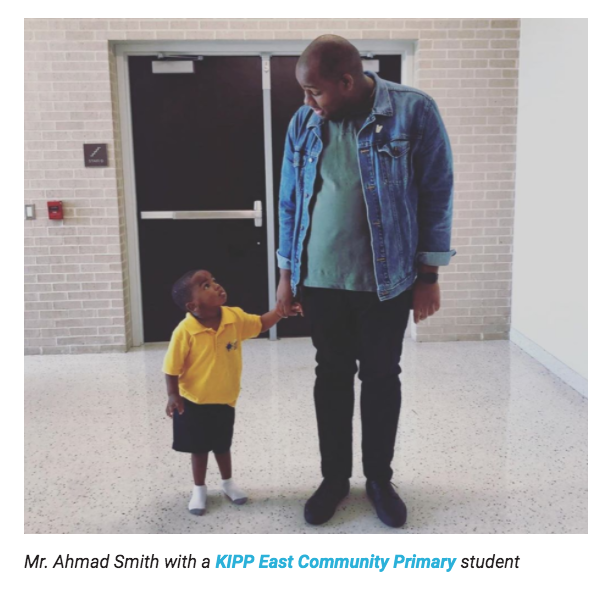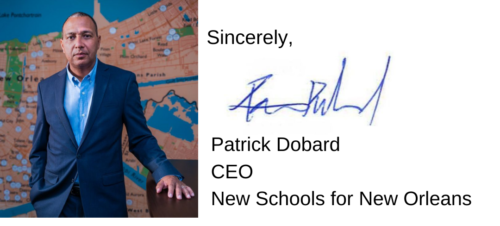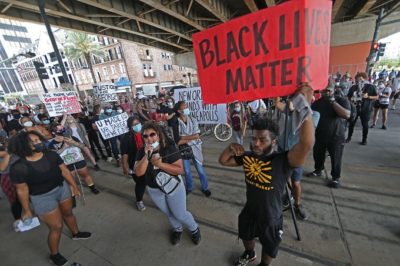In the past few days, I have read powerful statements from individuals and organizations condemning the racist murders of Ahmaud Arbery, Breonna Taylor, and George Floyd. NSNO has made our own.
But now comes the hard part. Statements are important, but statements without actions are false promises. Denouncing racism is not enough; you must actively pursue racial equity. You must audit your own actions and those of organizations in which you are involved for the ways in which they perpetuate systems of oppression. That requires more than a tweet or a single conversation. At NSNO, our job is to support schools, and in so doing, support students—in New Orleans, 91% of them are people of color.

Every single action we take, at NSNO, fuels our pursuit of racial equity. One of our values is equity, and the others—passion, excellence, and solutions—are all tied to this fight. Our work continually evolves, but it did not begin with the recent protests, and it will never end—the fight for justice is at the foundation of our efforts. By sharing this, I hope to start a conversation, spur others to take action, and to hold ourselves accountable to take new and more action where it is needed.

Internally, NSNO works to ensure that our hiring practices result in a diverse pool of excellent candidates. In my time at NSNO, we have prioritized using our funds to support people of color in hiring and purchasing—from hiring Black-led consulting groups like The Papyrus Group, to banking with the Black-owned Liberty Bank, to catering office events with Black-owned restaurants. To continue to push ourselves as individuals and as a team, NSNO’s staff engages in quarterly diversity, equity, and inclusion sessions with Visions, an organization led by a woman of color.
And all of our priorities—talent, portfolio, policy, curriculum, and communications—are grounded in the work for racial equity. Educational equity is inextricably linked with racial equity, and we cannot move toward one without the other:
PRIORITY: TALENT
-
We are committed to helping recruit and retain teachers of color in New Orleans. For three years, we have been a part of the SEED Partnership, through which five organizations are supported by a $13 million federal grant to recruit and prepare hundreds of new teachers in our city. The grant focuses teachers of color and teachers from New Orleans in particular; so far, 60% of teachers have been people of color. Critically, the grant supports teacher training that is grounded in culturally relevant practices.
-
We have focused support, in particular, on Xavier’s teacher education program. As a historically Black university, Xavier is an invaluable part of recruiting Black educators for our childrens’ schools.
-
We have chosen an intentionally diverse group of educators to be a part of our E3 Fellowship, which prepares future charter network leaders so that our city’s charter networks are managed by a powerful and diverse cohort going forward. Over half of the fellows are people of color and a third are new Orleans natives.
-
We host monthly meetings for school and network “talent leads” and hiring managers to discuss diversity and equity practices in hiring, alongside other crucial issues, like hiring during COVID-19 closures.

PRIORITY: PORTFOLIO
-
NSNO has recently begun to work with charter school organizations as they engage in CEO succession planning. This process requires that boards both evaluate the biases and unspoken criteria according to which they might evaluate CEO candidates, and that they consider the diversity of their internal leadership pipeline.
- NSNO partners with Beloved Community, an organization that works with schools and workplaces on equity, to fund both Equity Audits and participation in the Equity in Schools Cohort for growing and transforming schools.
PRIORITY: POLICY
-
We worked with NOLA Public Schools to allocate almost $7 million over the next three years from their Systemwide Needs Fund to be used for teacher preparation and development, particularly for teachers of color.
-
We advocated and raised funds to address the educational inequity deepened by a lack of access to technology in this moment of distance learning. We have been part of the work to connect our city’s public school students, 91% of whom are people of color, to the internet. Our New Orleans Technology Access Fund has raised nearly $700,000 to offset the costs of NOLA-PS’ purchase of wi-fi hotspots.
PRIORITY: CURRICULUM
-
We fund schools’ purchase of “Tier 1” curricula (curricula designated by the state as the highest quality and aligned with state standards), as well as support in implementing them. We have frequent touchpoints with all school leaders, 54% of whom were people of color in 2018-19.
-
We launched our flagship initiative, the Instructional Quality Initiative, by joining forces with the Louisiana Department of Education to send hundreds of educators to a workshop led by UnboundEd called the Standards Institute. This workshop centered around equity in instruction and creating equitable classroom environments.
-
Our work means that more New Orleans’ students—91% of whom are people of color—have access to the highest quality curriculum. Prior to the Instructional Quality Initiative, for instance, just 18% of our city’s schools were using Tier 1 English Language Arts curriculum. Now, 65% are. This has a powerful effect on the learning of our children of color.

PRIORITY: COMMUNICATIONS
-
We collaborate with students and families to tell the stories of how many students of color experience our education system. We have been glad to collaborate with young people like Rodney Johnson and parents like Melissa Jones and Clara Baron-Hyppolite.
-
We seek diversity and equity when we highlight students, school leaders, and teachers in our city. The majority of teachers and students in New Orleans are people of color, so we believe the majority of teachers and students that we profile should be, too.
-
In our new radio show with WBOK, I have been interviewing students, educators, and leaders of color from across the city.
-
In collaboration with the Louisiana Association of Public Charter Schools, we have produced an Education Heroes video series highlighting primarily teachers and school leaders of color from across New Orleans.

We will continue to push ourselves. We have made great progress, but our work is nowhere near finished. Together, we have over 400 years of oppression to undo, so the work is always urgent in our minds and in our spirits. We will always have more to do, and we will never stop striving to be better.
This is personal to me. For most of my 30 year career, I have often found myself as the only Black man in “the room,” if I was in “the room” at all. But once I was able to have access, I have been committed to using my position to highlight the inequities that I faced and work toward solutions. When our students grow up, I want them to see leaders and colleagues that look like them; I do not want them to be outliers in board rooms or executive teams.
That is part of why, at NSNO, I am proud to work alongside so many excellent and diverse professionals; we have been intentional, since my first day, in hiring such a team. I am also grateful for my relationships with powerful Black educators across New Orleans, such as those I meet with and mentor through “Young, Educators, and Black,” a group of Black educators early in their careers.
Together, we will keep working for change. This fight did not begin with the murders of Ahmaud Arbery, Breonna Taylor, and George Floyd, and the protests these murders set off will not end it. I share our steps with the hope that other organizations and leaders will share the actions they are taking, too. As I often note, the work of education is complex, nuanced and hard. But we will never stop being a part of it. We encourage everyone to do the same. Make the statements, but then do the work.


